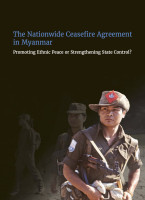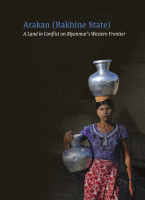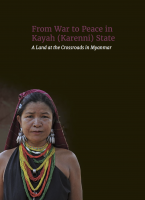The Conflict Trap in Myanmar A new series of Podcasts analyzing Myanmar’s recent history
Regions
TNI has introduced a series of podcast interviews with Martin Smith* on the conflict history of Myanmar. Through extensive travels and experiences, he has researched and reported about Burma/Myanmar and ethnic nationality affairs since the early 1980s for a variety of media, non-governmental and academic organisations. These podcasts reflect on the cycles of conflict and causes of state failure, arguing that only political solutions will achieve sustainable peace, justice and long-needed reform that reach to all peoples.
Martin Smith
People often say to me: ‘Why Burma, you are a foreigner, why are you writing about this?
When I was first interested in Burma, it was about history and culture. I had no idea that the country was in such a chronic state of civil war except for occasional stories in the newspapers. But I was very early on alerted to this. Wherever I travelled I met older people, many from an earlier generation who were important in the past. People like Saw Tha Din who was in the Karen delegation to London in 1946, Duwa Zau Rip, a Kachin who had been at the Panglong meeting, and Nai Shwe Kyin, a Mon leader. They and their families gave me an enormous amount of time, they were so friendly, and they were always talking about the politics. At that time I was writing down their stories and realised that nobody much had been interviewed. I realised that I needed to write a book.
These stories were very impressive. This was a generation who really did want to look for solutions but had failed. At the time, I thought writing about it can help in bringing solutions. And the events of 1988 then happened, and Burma was suddenly on the international stage. It went from being one of most forgotten countries in the world to one of the countries which the United Nations put on top table as a country of emergency and concern.
Now, when I am getting older myself, I begin to realise that those people who told me those stories – about their peoples, the conflicts and the problems – I think they realized that their stories were not known. I think they felt I would be somebody who would remember, write it down and record it so that, when they were gone, their stories were still being told. When I write on Burma, I always want to write on universal principles of human rights, the UN charter of human rights. All humans are equal, and everyone has the rights to education, health, livelihoods and life. The stories told to me were very moving, very serious and made me realise that the tragedy is going round and round again.
So the least that I can do as I get older is to pass on what I learned so that those memories are not forgotten. Because of the isolation of Burma and because of the civil war, younger people today often have not heard those stories. One day hopefully they will. But when there is censorship and war, it is very hard to get to stories out. So that is where I hope a foreigner can be instructive.
* Publications by Martin Smith include Burma: Insurgency and the Politics of Ethnicity, Ethnic Groups in Burma: Development, Democracy and Human Rights, State of Strife: The Dynamics of Ethnic Conflict in Burma, and Arakan (Rakhine State): A Land in Conflict on Myanmar’s Western Frontier. His television work on Burma includes the documentary Dying for Democracy. He is also a co-founder of the Prospect Burma educational trust, former independent expert member of the Three Diseases Fund board, and senior advisor to the Transnational Institute.
Contents:
- Episode 1: Alphabet Soup
- Episode 2: The Strategy: Conflict as a way of life
- Episode 3: The Conflict Trap
- Episode 4: The Peace Process: The need to reflect on history
- Episode 5: 1988 and 2021: Why the generational protests today are importantly different
- Episode 6: The 1948 Generation: the tragic consequences of failure to solve the independence problems of state
- Episode 7: Why Burma? The call of history
You can find the podcasts on the following platforms:
Buzzsprout: https://www.buzzsprout.com/2243233/episodes
Spotify: https://open.spotify.com/show/5XHZy1LIsGKrOiwpMB6oLL
Podcast Index: https://podcastindex.org/podcast/6599476
Podcast Addict: https://podcastaddict.com/podcast/info-for-ethnic-groups-in-myanmar/4604459
Podchaser: https://www.podchaser.com/podcasts/info-for-ethnic-groups-in-myan-5463739/episodes/recent



